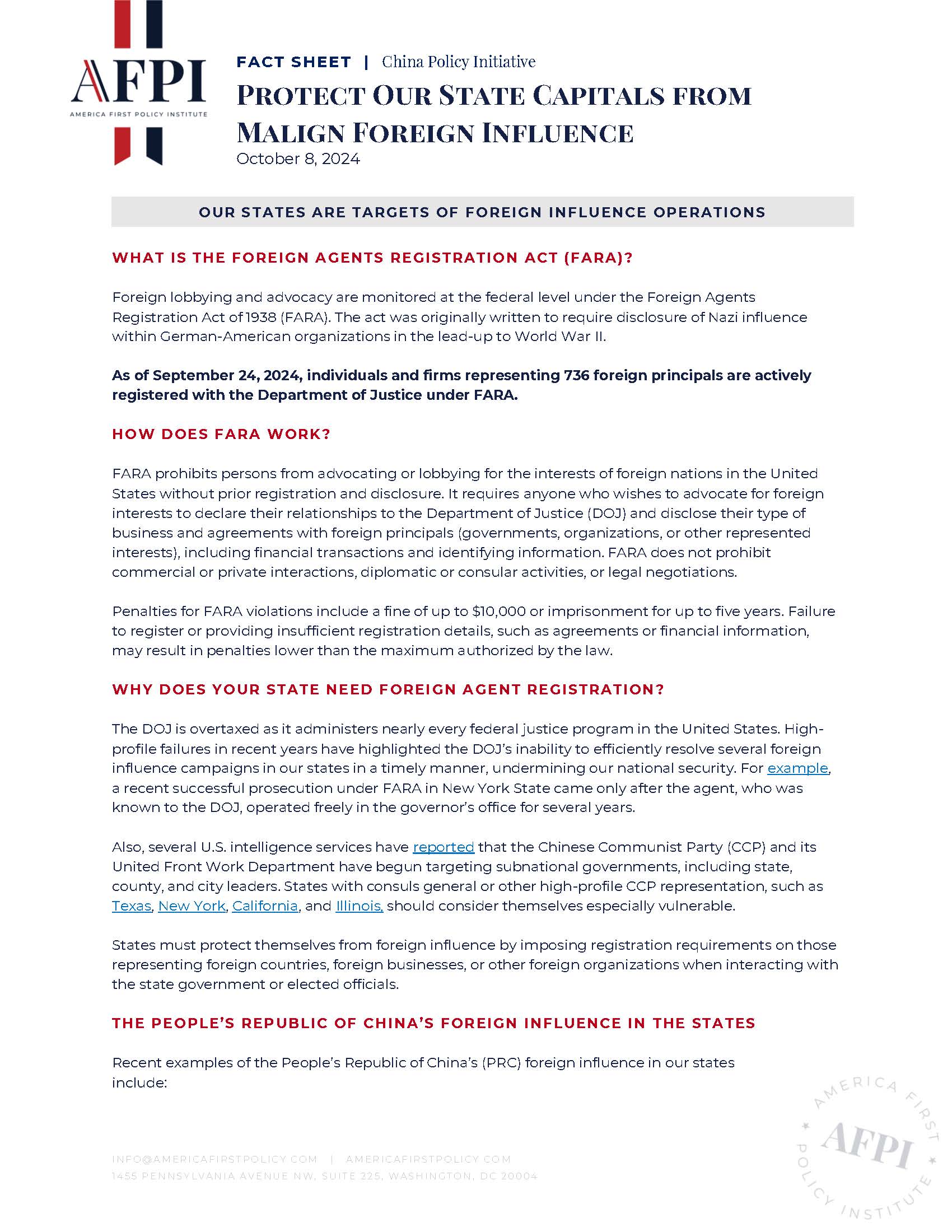Protect Our State Capitals from Malign Foreign Influence
OUR STATES ARE TARGETS OF FOREIGN INFLUENCE OPERATIONS
WHAT IS THE FOREIGN AGENTS RESTRICTION ACT (FARA)?
Foreign lobbying and advocacy are monitored at the federal level under the Foreign Agents Registration Act of 1938 (FARA). The act was originally written to require disclosure of Nazi influence within German-American organizations in the lead-up to World War II.
As of September 24, 2024, individuals and firms representing 736 foreign principals are actively registered with the Department of Justice under FARA.
HOW DOES FARA WORK?
FARA prohibits persons from advocating or lobbying for the interests of foreign nations in the United States without prior registration and disclosure. It requires anyone who wishes to advocate for foreign interests to declare their relationships to the Department of Justice (DOJ) and disclose their type of business and agreements with foreign principals (governments, organizations, or other represented interests), including financial transactions and identifying information. FARA does not prohibit commercial or private interactions, diplomatic or consular activities, or legal negotiations.
Penalties for FARA violations include a fine of up to $10,000 or imprisonment for up to five years. Failure to register or providing insufficient registration details, such as agreements or financial information, may result in penalties lower than the maximum authorized by the law.
Why DOES YOUR STATE NEED FOREIGN AGENT REGISTRATION?
The DOJ is overtaxed as it administers nearly every federal justice program in the United States. High-profile failures in recent years have highlighted the DOJ’s inability to efficiently resolve several foreign influence campaigns in our states in a timely manner, undermining our national security. For example, a recent successful prosecution under FARA in New York State came only after the agent, who was known to the DOJ, operated freely in the governor’s office for several years.
Also, several U.S. intelligence services have reported that the Chinese Communist Party (CCP) and its United Front Work Department have begun targeting subnational governments, including state, county, and city leaders. States with consuls general or other high-profile CCP representation, such as Texas, New York, California, and Illinois, should consider themselves especially vulnerable.
States must protect themselves from foreign influence by imposing registration requirements on those representing foreign countries, foreign businesses, or other foreign organizations when interacting with the state government or elected officials.
THE PEOPLE'S REPUBLIC OF CHINA'S FOREIGN INFLUENCE IN THE STATES
Recent examples of the People’s Republic of China’s (PRC) foreign influence in our states include:
- In August 2024, Linda Sun, former Deputy Chief of Staff to the Governor of New York was indicted in the Eastern District of New York for violations of FARA. The allegations against her include acting as an unregistered agent of the PRC over several years despite being warned by the FBI in 2020, primarily through invitations for PRC representatives to meet with state officials in exchange for payment, as well as intentionally disrupting Taiwanese relations with state officials. Following this revelation, the PRC Consul General in New York City was expelled.
- In 2023, the Associated Press uncovered a massive Chinese lobbying operation in Utah that successfully convinced the state to delay its banning of Confucius Institutes and to pass resolutions favorable to China, including “solidarity” statements with them in the early days of COVID-19. Additional measures, such as condemnations of China’s actions in Xinjiang against Uyghurs, failed after a “hyperlocal” pressure campaign from Chinese-born Utahns.
- California Governor Gavin Newsom has made frequent trips to and agreements with China, including meeting with PRC President Xi Jinping on a variety of issues, primarily climate. The U.S. Attorney for the Central District of California said in a closed-door interview in 2023 that California serves “[as] the gateway to Asia […] and we have the [PRC] trying to influence our elections [and] our [elected] individuals.” The Washington Post noted this September that San Francisco has a particularly deep infiltration of PRC agents and groups. This involvement activated numerous groups in anticipation of Xi’s visit late in 2023.
AMERICA FIRST POLICY SOLUTIONS
To combat foreign influence in America’s states, the America First Policy Institute recommends legislation including these three pillars:
- Enacting a foreign agent registration program, primarily headquartered with either the host state's secretary of state, attorney general, ethics commission, or legislature. Registration and information sent to the committee or coordinating office should be publicly hosted and accessible to the general public. The required information should include:
- The agent’s name, business address, and all residence addresses;
- Financial transactions, contracts, and agreements with the represented countries;
- Details of every lobbying activity, purchase, interaction, or meeting taken;
- Appearances or meetings taken of a political nature (e.g., campaigning, fundraising); and
- Other statements the supervising body may deem necessary.
- The act should explicitly allow the following activities without registration to avoid violations of constitutional rights:
- Private business dealings, or entirely private transactions to which the government, an elected official, a state employee, or a government contractor is not a party;
- Consular or diplomatic deals or meetings when officially conducted via an embassy of a foreign nation to the executive or legislature of the state in a public manner or when conducted by a government official of a foreign country; and
- Legal dealings or negotiations either representing another disclosed registered foreign agent or negotiating party.
- A prohibition on foreign contributions to state political campaigns. This should include foreign corporations and their domestic subsidiaries. To further disincentivize such behavior, political organizations, campaigns, or other organizations should also face potential penalties for knowingly receiving foreign money.
For more information on how to oppose the CCP’s malign influence in our state and federal governments, visit us at https://afpius.com/china-policy-initiative
